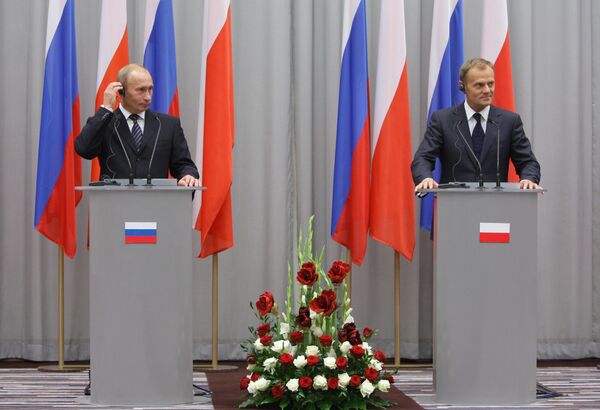MOSCOW. (RIA Novosti commentator Dmitry Babich) - If anyone thought that all Poles were equal in their antagonism towards Russia, it would be enough to spend just one minute listening to the recent speeches by the president and the prime minister to realize that a whole spectrum of opinions exists in Polish society regarding the Soviet Union's role in World War II and Russia's current relations with Poland.
Lech Kaczynski, president of Poland and leader of the conservative party Law and Justice, relied on standard propaganda stereotypes. He said that unlike Russians, Poles had nothing to be ashamed of. Kaczynski recalled the Katyn massacre in which 20,000 Polish officers were killed by Soviet forces, comparing it to the Nazi genocide of the Jews.
These sharp words, although pleasant to many Poles, are half-truths. Moreover, Kaczynski was juggling with facts, far from all of them true.
According to the documents of the Soviet Union's secret police, NKVD, on the Katyn massacre and detainment of Polish officers, published in the Soviet Union in 1989-1991, they were killed not because they were Poles but because they were "class enemies."
Most of the Poles killed at Katyn were professional military and police officers, and only few were intellectuals and members of anti-Communist political parties. Part of the detained Polish workers and peasants were released in 1939-1940 and allowed to return to their homes in the eastern Polish regions, by that time occupied by the Red Army.
I am not trying to justify murder as a Bolshevik method of class struggle, well known to the Russian people. However, the decision to execute Polish officers at Katyn was taken by Stalin and several members of the Communist Party's Politburo secretly even from Soviet people, and therefore differs from the Holocaust, which was preceded by a long, public and shameless anti-Semitic campaign partially supported in many European countries.
Unlike Kaczynski, Prime Minister Donald Tusk, a center-right politician and chairman of the Civic Platform party, refrained from comparing the Soviet Union to Nazi Germany, even though he said that the Molotov-Ribbentrop Pact had provoked the war, sticking to the official Polish position.
Relations between Kaczynski and Tusk have been tense, even though they are both rightwing politicians. They also have different attitudes toward Russia.
In Poland, the prime minister is as influential as the president, with the Polish parliament determining the country's policy and the premier making practical decisions after coordinating them with the parliamentary majority.
Since Tusk's party now has a majority in parliament, he carries more political weight than President Kaczynski. The Civic Platform pushed out the Kaczynski brothers' party, Law and Justice, at the 2007 parliamentary election.
Poland's relationships with Russia and Germany deteriorated in 2005-2007, when the country was ruled by the party of Lech Kaczynski and his brother Jaroslaw, then prime minister.
Polish intellectuals and part of the media hoped that the Kaczynskis would direct their hatred only at Russia, but the brothers also unleashed a campaign against the Federation of Expellees (BdV), which represents the interests of the Germans who either fled their homes or were expelled by the Polish and Czech authorities following WWII.
With the exception of the Law and Justice party, other Polish politicians have been positively impressed by Putin's address and his letter to the Poles published in the newspaper Gazeta Wyborcza a day before his visit.
On the other hand, the newspaper's editor-in-chief, Adam Michnik, who has a negative attitude to the Kaczynski brothers and their party, does not fully agree with what Putin writes in his letter.
Michnik writes in his response to the Russian premier that it would be wrong to compare the Munich Agreement, even though it was "a fatal mistake made by democratic Europe," to the "joint Hitler-Stalin aggression against Poland."
"This, however, does not diminish our gratitude and admiration for the heroism of the thousands of soldiers of the Red Army who died in Poland fighting Nazi occupiers," Michnik writes.
What is most important, he suggests not to link up historical problems with the current Polish-Russian relations. He also refrains from making doubtful populist statements. Unlike Foreign Minister Radoslaw Sikorski, he does not compare the Nord Stream gas pipeline project to the Molotov-Ribbentrop Pact.
Prime Minister Tusk pursued a comparably mild line during his joint press conference with Putin.
A balanced and pragmatic attitude toward Russia and Russian leaders is gradually developing in Poland. Evidence of this is the fact that the essence of Putin's article has been supported not only by Michnik, but also by such previously anti-Russian politicians as parliament speaker Bronislaw Komorowski and ex-Foreign Minister Adam Rotfeld.
If Vladimir Putin's visit to Poland strengthens this positive trend, the Russian prime minister can consider his mission accomplished.
The opinions expressed in this article are the author's and do not necessarily represent those of RIA Novosti.



